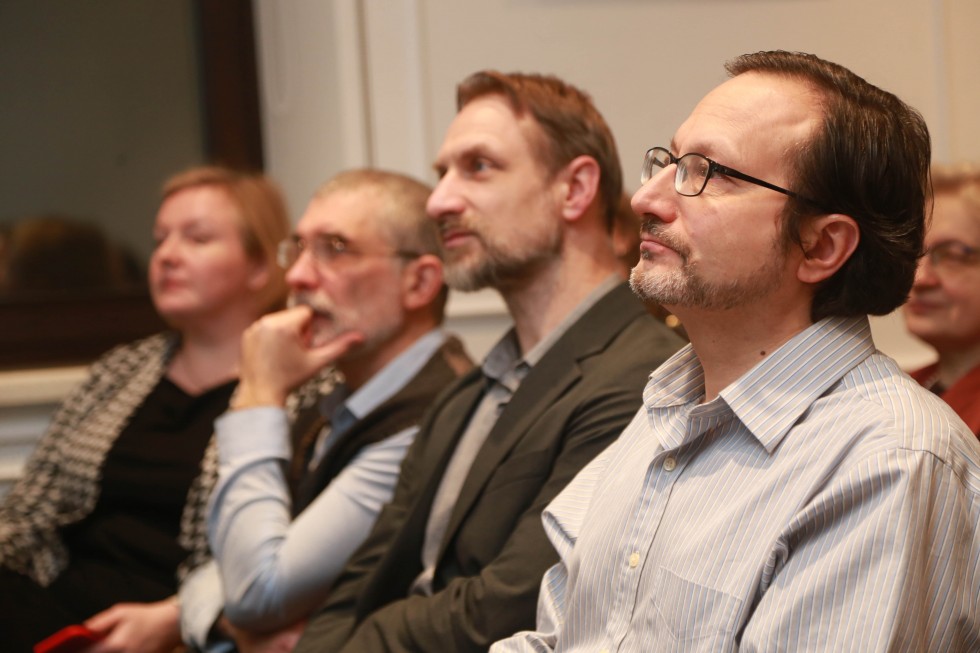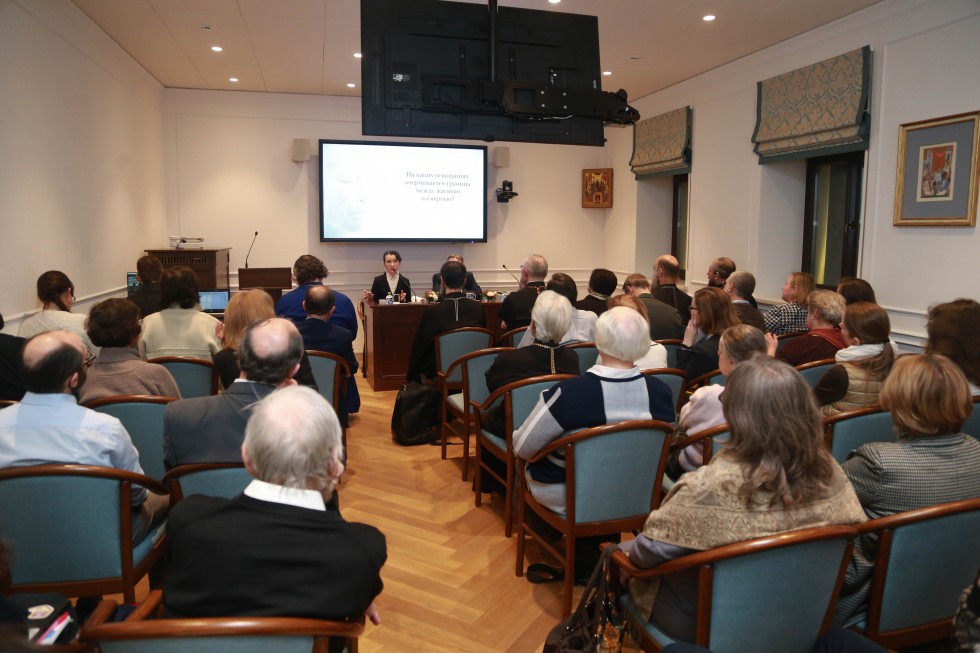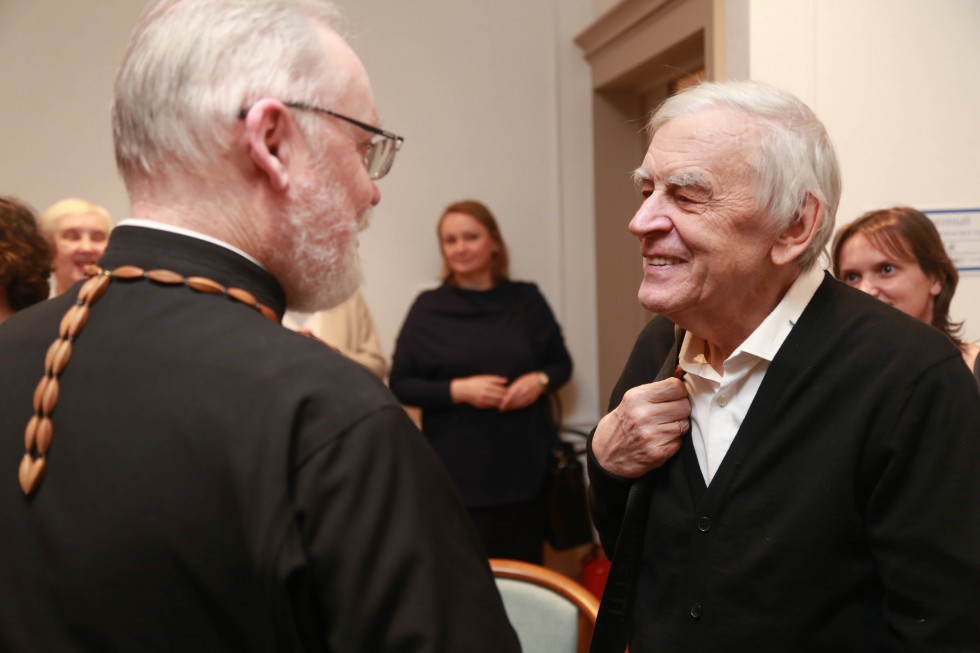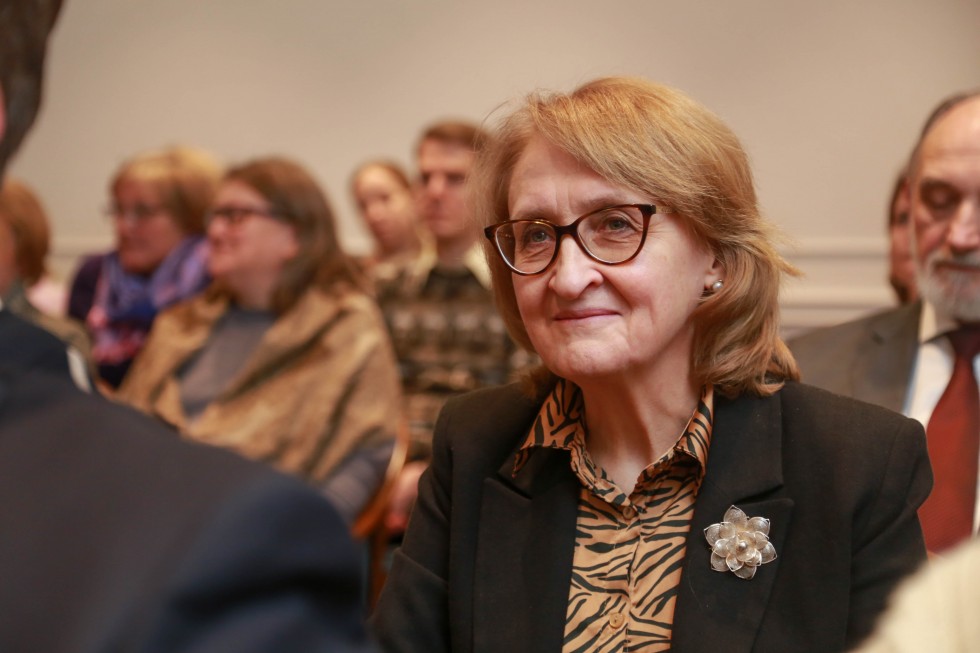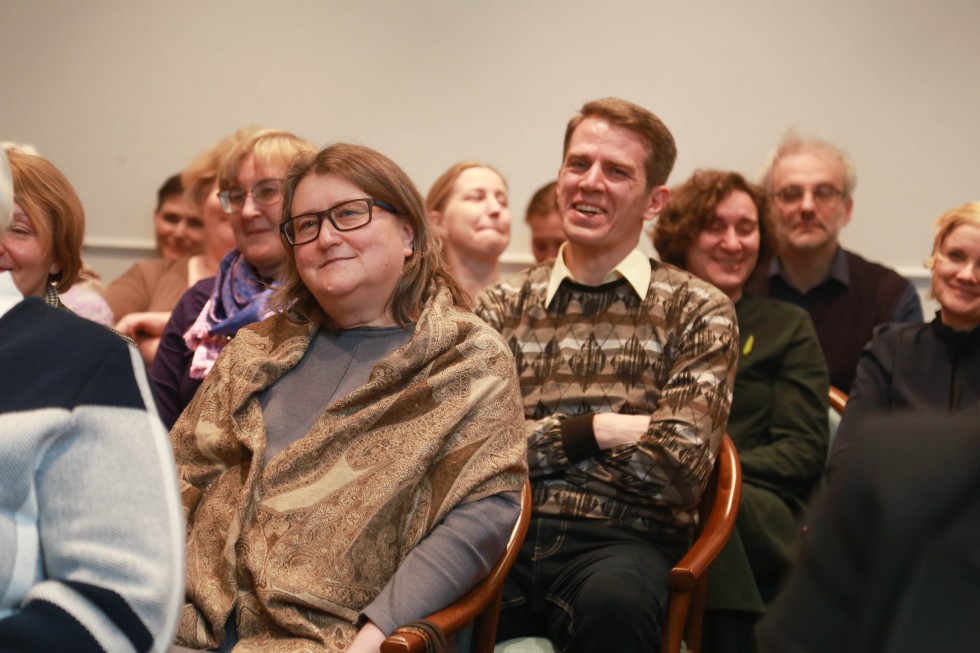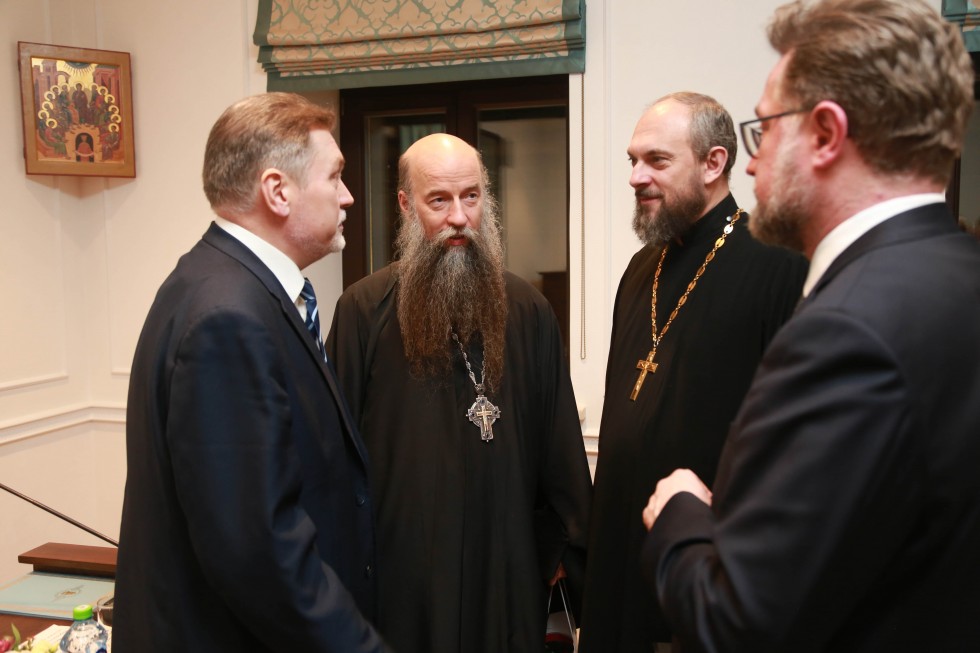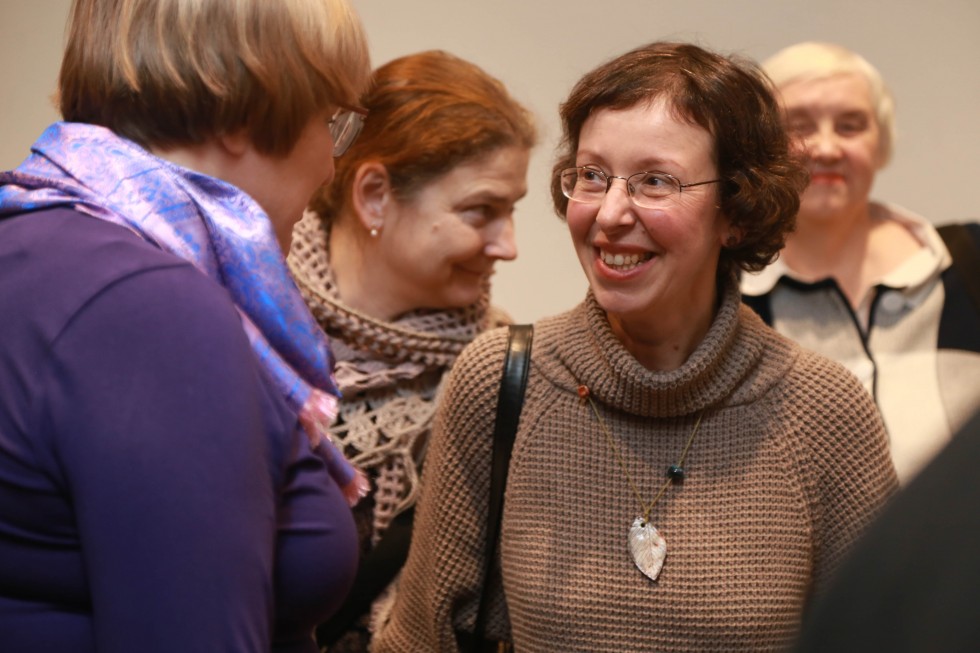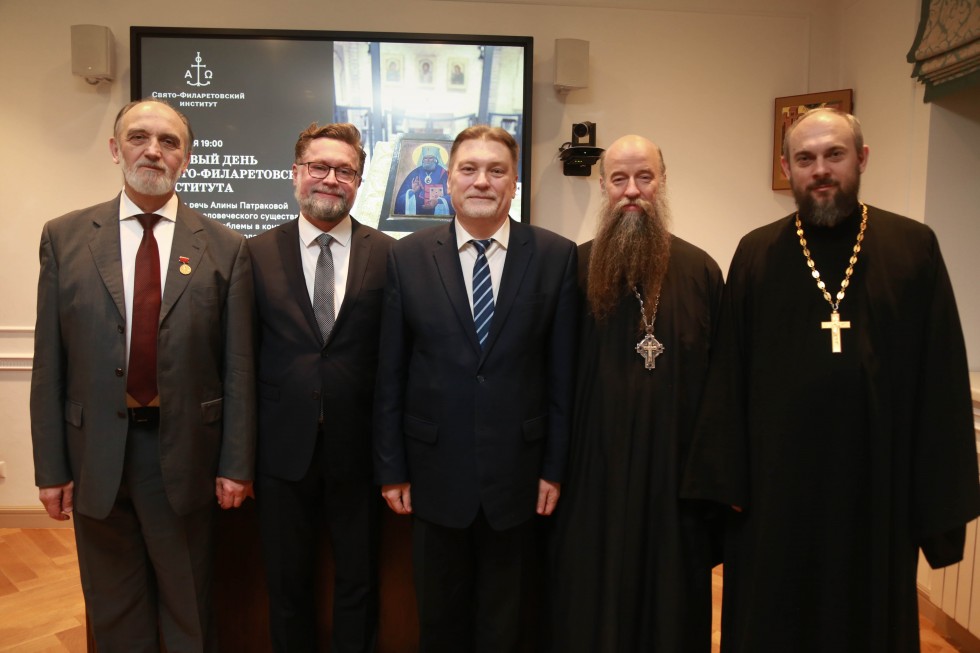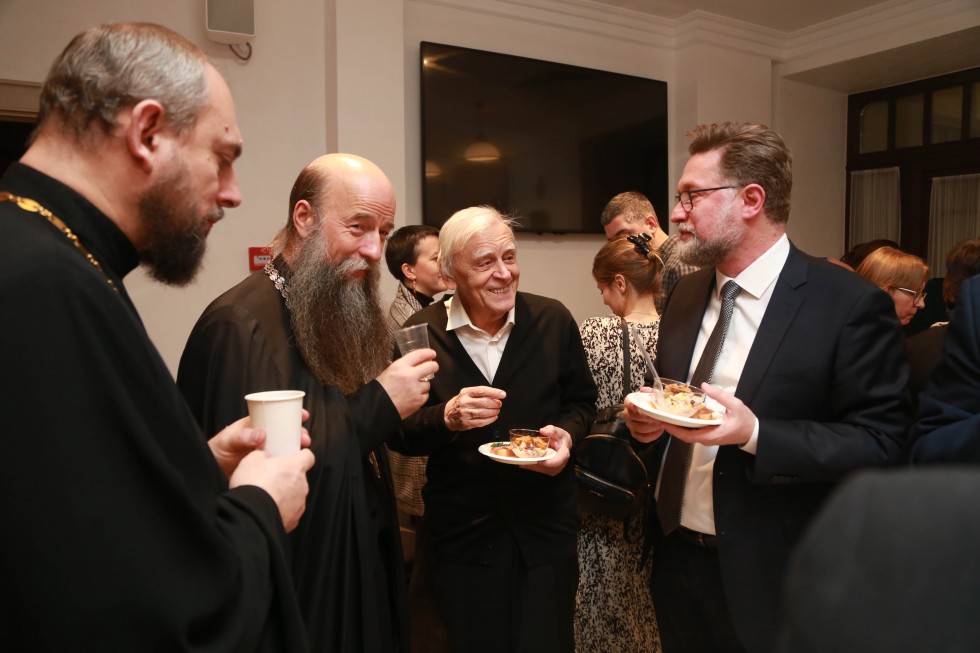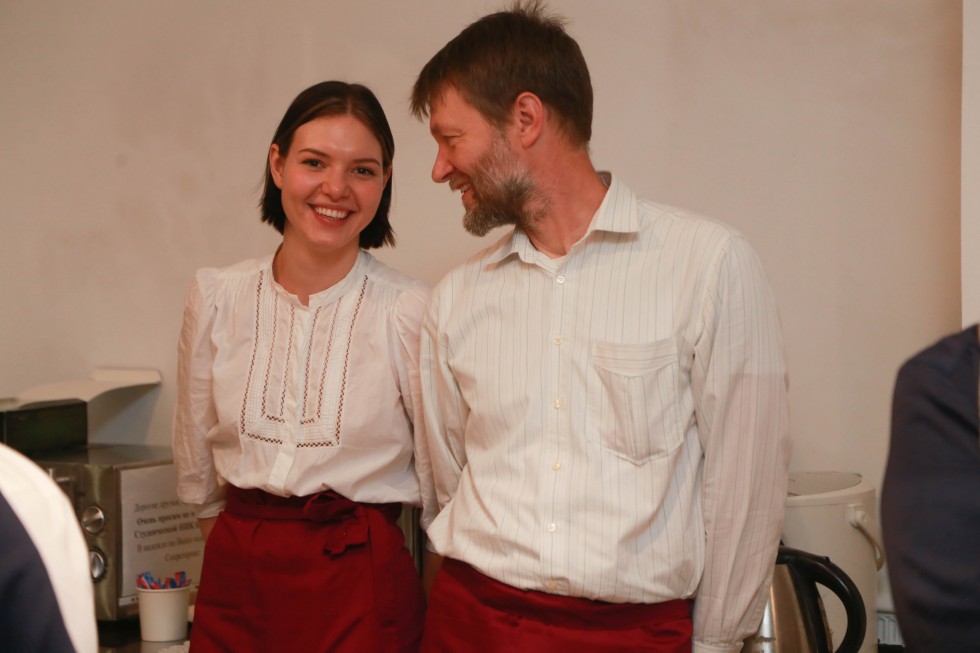Saint Philaret’s Institute Celebrates its 35th Anniversary
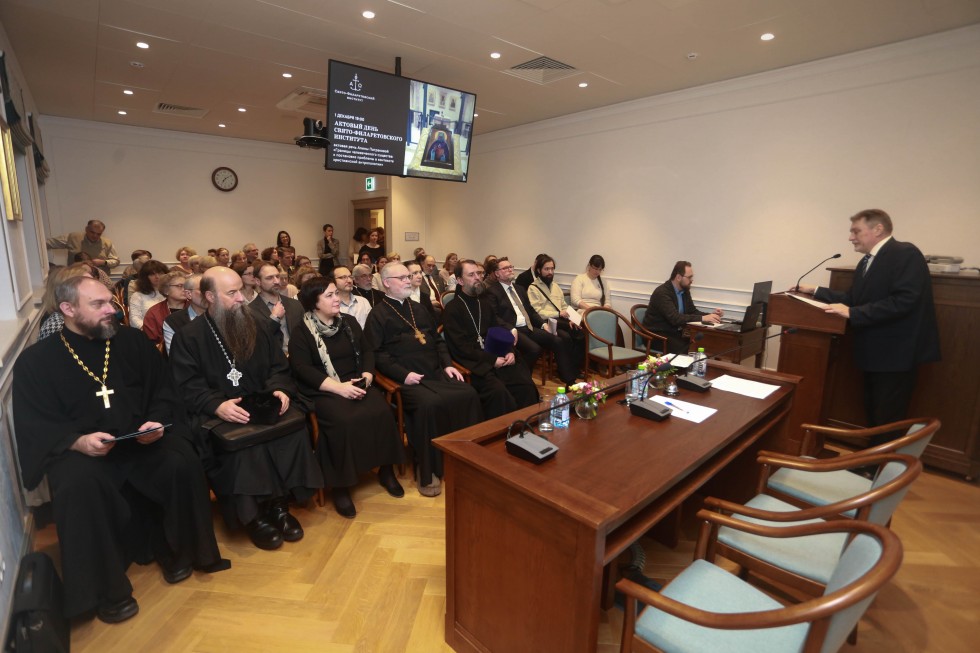
“The Feast of St. Philaret, when we gather together to think about our mission and how we go about it, is once again upon us. It’s an intellectual pleasure to listen to the special report which has become a tradition for us on this day.” With these words, SFI Rector, Doctor of History and Professor Alexey Mazurov, greeted the evening’s guests.
“St. Philaret’s Institute holds a particular place within the system of spiritual educational institutions in our country. We do not prepare pastors for service. Our audience of students is laypeople. Our mission is to deliver education and enlightenment that dovetail with daily life, becoming a determining factor. We believe that this will bring enormous fruits to our church in Russia, to orthodox Christianity in general, and to our society,” he continued.
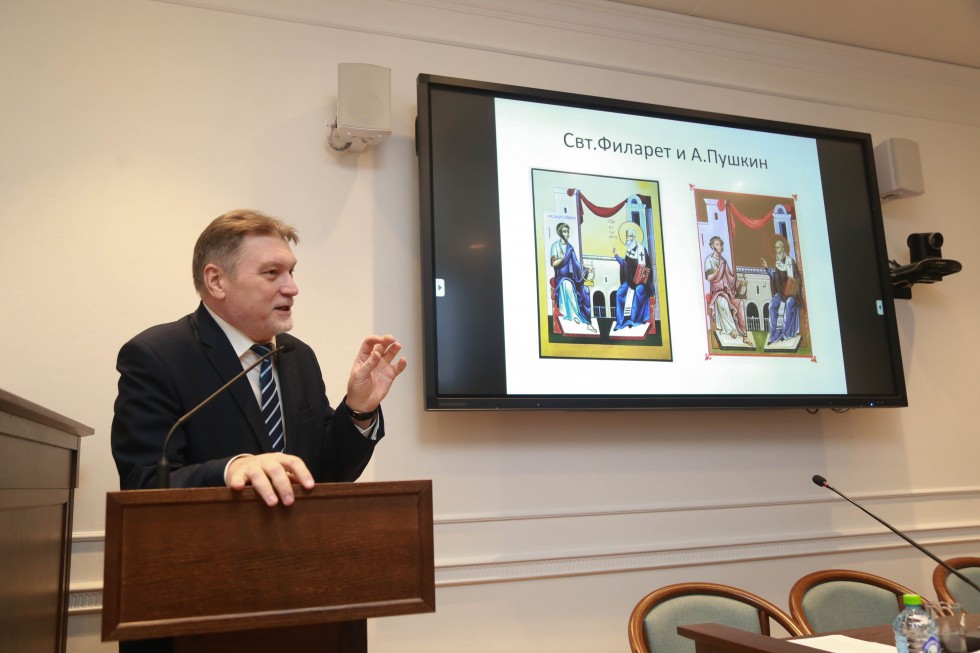
Alexey Mazurov
Alexey Borisovich prepared his own intellectual gift for the gathered assembly in the form of a small presentation of various iconographic images of St. Philaret of Moscow. The images varied significantly from each other; some were quite rare and barely known. Some of them were surrounded with hagiographical iconographic scenes, but these collections of scenes also varied. Some of them included a scene with Aleksander Pushkin, while others didn’t.
Abbot Mefodij (Zinkovskij) was present to pass along the blessings and greetings of His Holiness Patriarch Kirill of Moscow and All Russia to the Founder, Rector and employees and students of St. Philaret’s Institute. His Reverence Mefodij is Abbot at the Nikolo-Ugreshsky Stauropegic Monastery and Rector of the Nikolo-Ugreshsky Orthodox Spiritual Seminary.
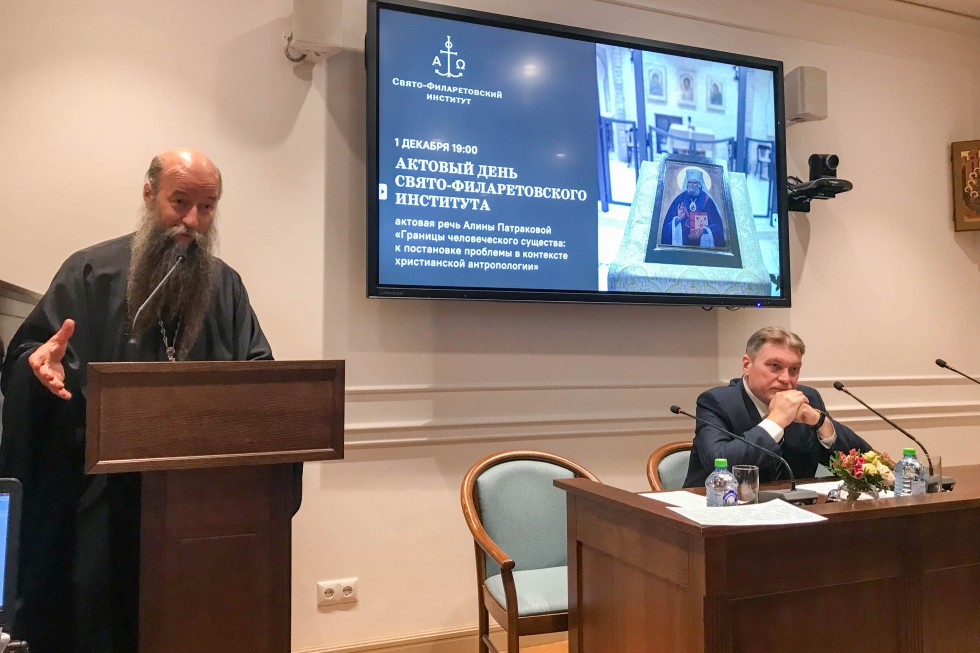
Abbot Mefodij (Zinkovskij)
Abbot Mefodij addressed the group saying, “Alexey Borisovich mentioned that the majority of SFI students are laypeople, but this in no way diminishes the significance of the Institute, but rather increases its importance. The Church is, first and foremost, the people of God.”
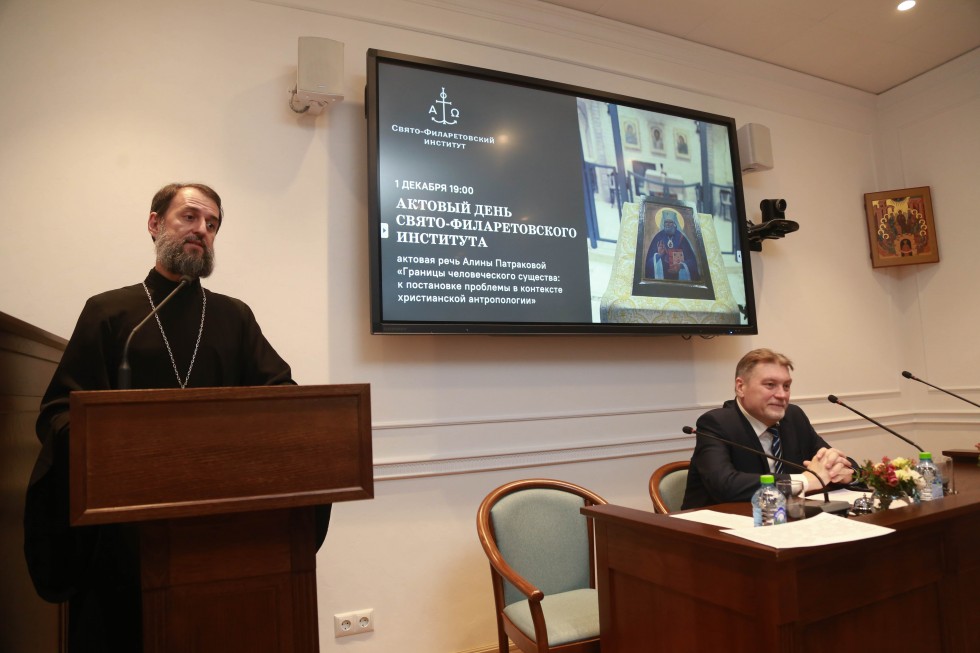
Fr Dmitry Kashirin
Fr Dmitry Kashirin, Head of the HR Department and Archive at the Education Committee of the Russian Orthodox Church, also greeted the assembly, passing along the blessing of Fr Maksim Kozlov, Chairman of the Education Committee.
Fr Mikhail Legeev, Candidate of Theology and Senior Lecturer at the St. Petersburg Theological Academy, passed on congratulations to St. Philaret’s Institute on behalf of Bishop Silouan of Peterhof, Rector of the St. Petersburg Academy.
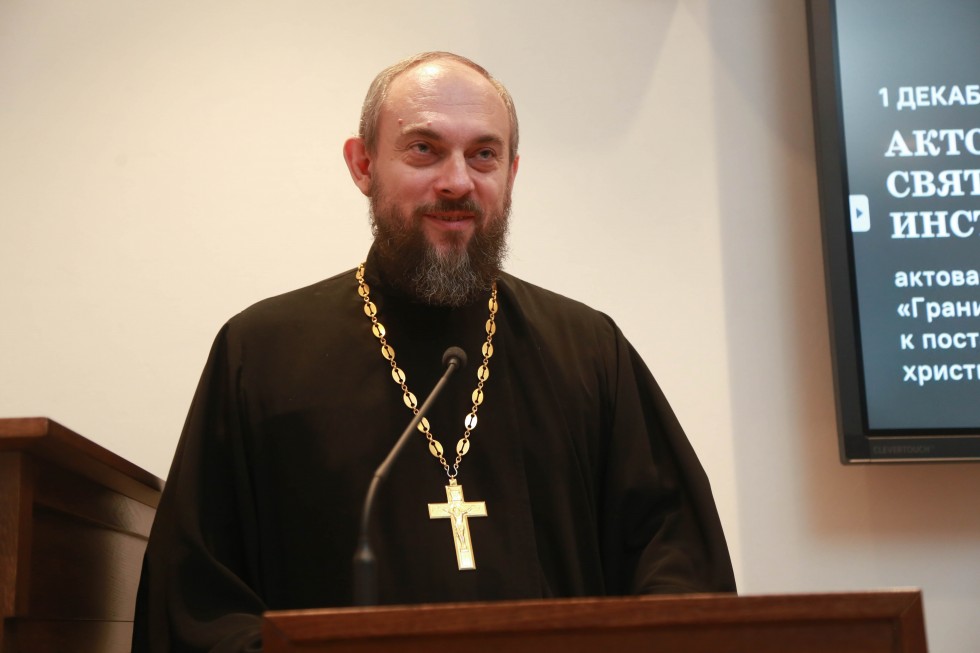
Fr Mikhail Legeev
“It would be hard to overestimate the importance of the work done every single day by your Institute,” Bishop Silouan said in his congratulatory message. “After all, passing on quality theological knowledge within the tradition and culture of the church is only part of the difficult work involved in the formation of a reasonable, thinking Christian and servant of the Church, who is himself called to reveal the path to God to the people of the world. We have, also, to nurture sincere and faithful Christians.”
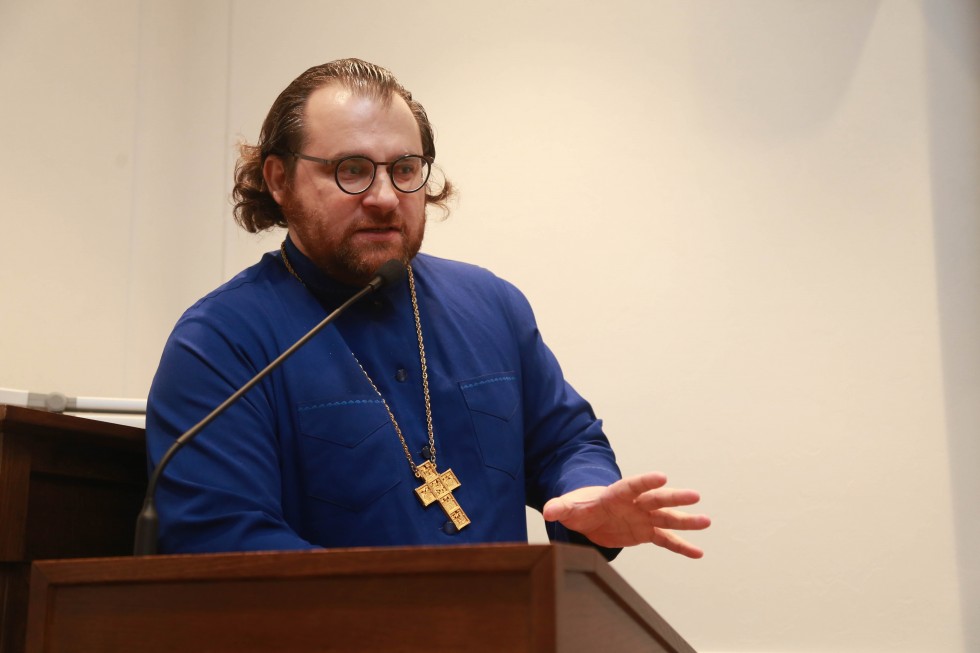
Fr Maksim Mishchenko
Greetings form his Eminence Metropolitan Isidor of Smolensk and Dorogobuzh, who is Rector of the Smolensk Theological Seminary, were passed along by Fr Maksim Mishchenko, his Assistant for Publishing.
The Vicar of the Patriarch of Moscow and All Russia, Acting Bishop for the Exarchate of Africa of the ROC, Bishop Konstantin (Zarajskij), also congratulated the Institute on the occasion on its anniversary.
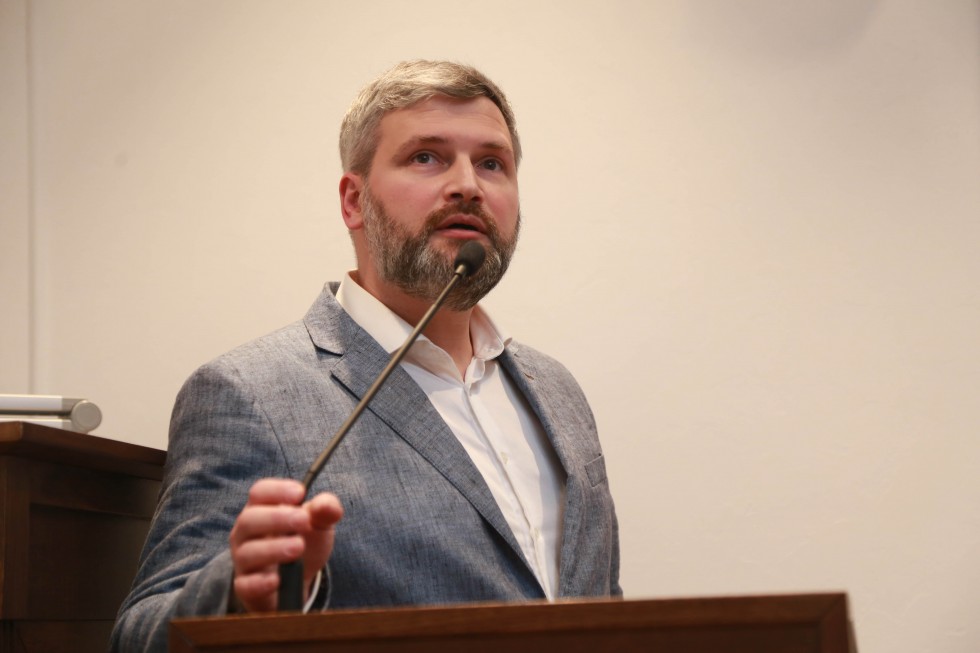
SFI alumni from Tver Anton Logoyskij greeted alma mater on behalf of the Association of SFI Alumni and Students
And, of course, there were the traditional congratulations from the Association of SFI Alumni and Students, which itself celebrated its 17th anniversary this year.
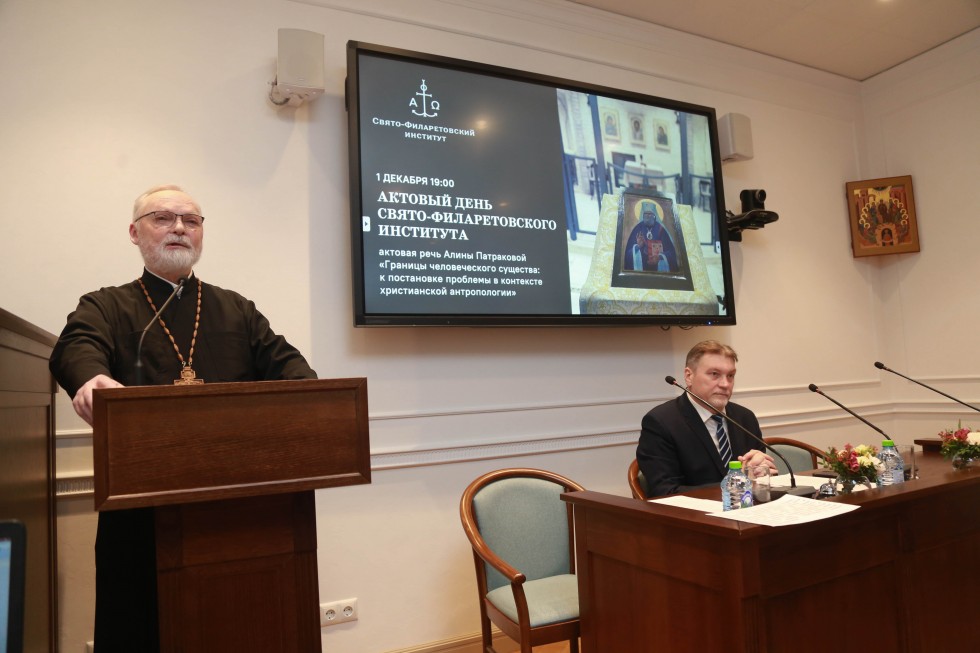
Fr Georgy Kochetkov
First Rector and founder of SFI, Fr Georgy Kochetkov shared his reminiscences saying, “Exactly 55 years ago I was also present on the Eve of the Feast of St. Philaret at the Moscow Theological Academy. It was December 1968, and His Holiness Patriarch Aleksij of Moscow and All Russia addressed the assembly. I was a student at a secular institute at the time, and the presentation made a tremendous impression upon me. You can imagine what the church was like at the end of the 1960s, after the end of the Krushchev era. The academy and seminary were tiny, and its Rector, at the time, was Bishop Philaret (Vakhromeev). The assembly was a very warm and friendly reception. Those people who had remained within the circles of the academy and seminary were prepared to preserve church life at any cost, without taking account of their everyday ties and interests, to say nothing of profits or advantages in life.”
“When, many years ago, our Institute took on the name of St. Philaret of Moscow, we did not, as yet, fully understand just how dear and native to us many of his character traits would become," added Fr Georgy. “We were thinking more of the fact that he was a translator and catechetical author, because these aspects of church life are very important to us. St. Philaret worked tirelessly to produce a translation of the Scriptures in Russian, and although he ran into a great deal of opposition, he lived through it all and was successful in his efforts. At this point, we use Russian translations of the entire Bible, and more than one translation exists, thanks be to God! Over the past decades we have been working to achieve the same possibilities in terms of translating church liturgical services into Russian, so that all who wish to serve in Russian may do so. And even if we don’t achieve the same heights that St. Philaret was able to achieve, I think, nevertheless, that he does hear our prayers – and not only our prayers, but also the prayers of the growing number of people from all dioceses who wish to serve liturgy in Russian.”
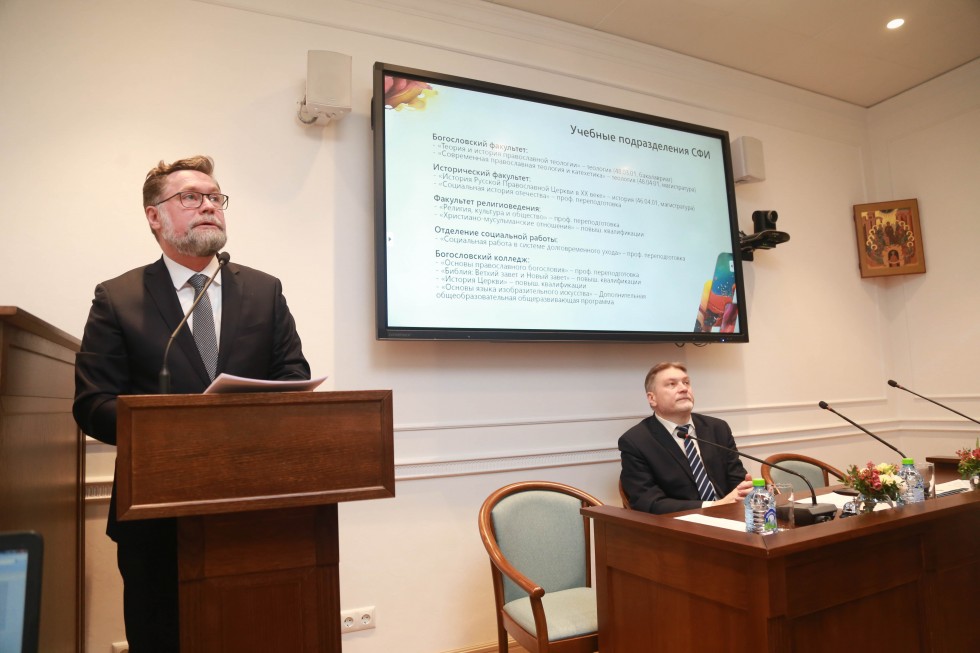
Dmitry Gasak
“Over the past year our Institute completed its 35th and began its 36th year of life and work. This is not a long period for an institute of higher learning, but relative to the lifetime of a single person it is significant,” said First Vice-Rector of SFI, Dmitry Gasak summing up the results of the Institute’s work for the past year.
Dmitry Gasak began his summary report, as has become traditional for us, by listing the names of colleagues and friends who passed away over the last year. Over the summer, one of our long-term SFI trustees, Doctor of Theology, Honored Doctor of the Moscow Theological Academy, Deacon Vasily Felmy, went to meet the Lord. Pierangelo Torricelli, a great friend of our Institute and of the Transfiguration Fellowship who was an advisor to the Christian Association of Italian Workers from the provinces of Como and Lombardy, also passed away this year. During his life, Torricelli did a great deal to develop friendly relations between Christian movements and to introduce his colleagues to Russian Orthodox experience.
“Sadly,” continued Gasak, “we’ve had losses, too, amongst our students during the past year. In May, one of our third-year students, Anna Agafonova, passed away. Many of us were witnesses to the fact that Anna continued her theological education to the end, with every bit of remaining strength, seeing in this education the momentum of life – forwards and upwards. Her thanksgiving for Christ, His Church, and for all the brothers and sisters, was an excellent and authentic witness to us.”
At present, SFI has three faculties of higher and supplementary vocational education (Theology, History and Religious Studies), as well as a separate Department of Social Work and our associated theological college.
This year, we welcomed 208 new students into our two magisterial programmes (Theology and History), our Bachelor of Theology programme, and the eight other programmes organized by SFI. At present, 472 students are studying at SFI.
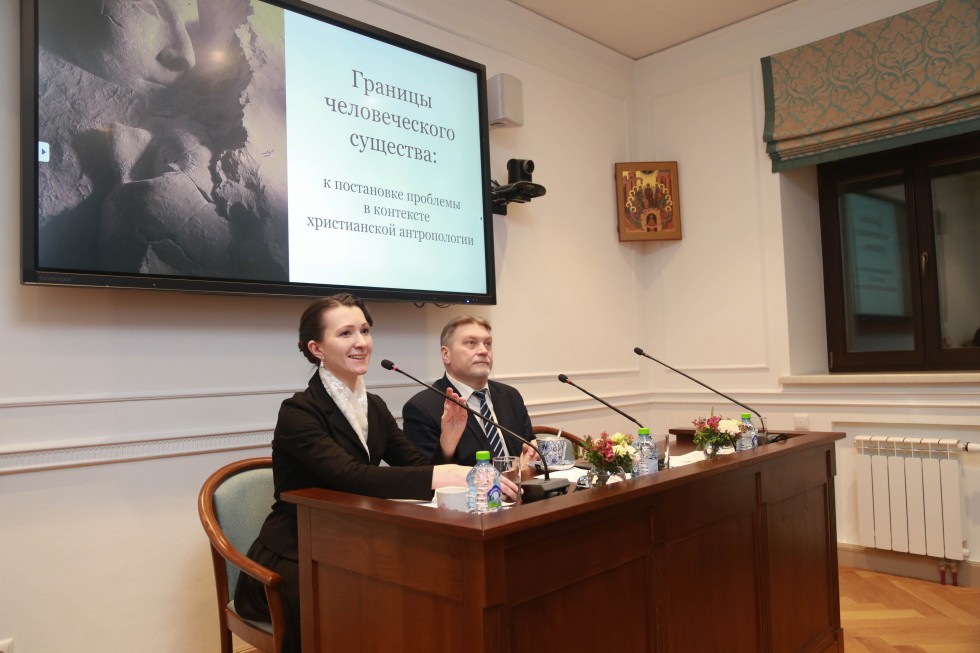
The keynote speech by Alina Patrakova
The keynote speech for the evening was delivered by SFI graduate, PhD Candidate and long-time SFI employee Alina Patrakova, who this year became the Institute’s Academic Secretary. Her presentation was entitled “The Borders of the Human Person: Posing the Problem in Terms of Christian Anthropology”.
“In my presentation today, I would like to touch upon one of the most acute and relevant questions, which simultaneously remains an “eternal” problem not only for Philosophy and Theology. This is the problem of defining what a human person is,” said Alina Patrakova. “My approach to posing this question is to begin with the borders that divide a person from whomever or whatever is not a human person.”
In particular, Alina Patrakova’s presentation made use of concepts from Russian philosopher Boris Grigorievich Yudin (1943–2017), who discerned at least four border zones in relation to human life: the border between non-being and being (the zone preceding the birth of the human person); the border between being and non-being (the zone between life and death); the border between human and animal; and lastly, the border between human and machine.
To listen to the full keynote speech, as well as the other presentations of the festive evening, please see this YouTube link.
